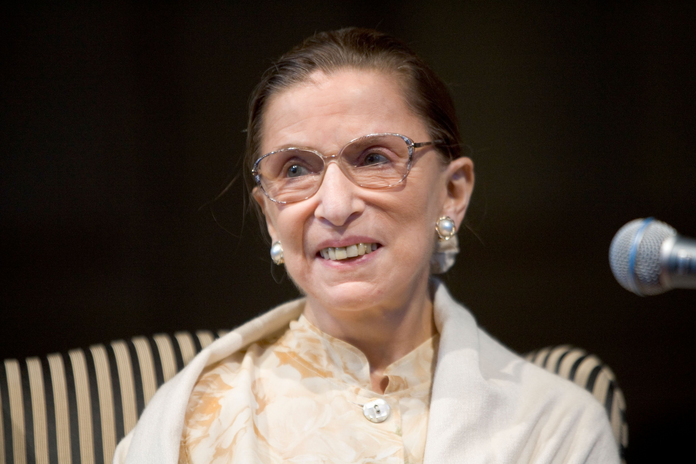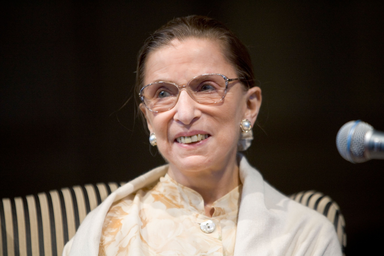Women all around the United States felt the pain and sorrow with the passing of Supreme Court Justice, Ruth Bader Ginsburg. To many, she was an icon and a superhero of a woman, a fighter, an activist, and a feminist. We remember her and her legacy, highlighting the important court cases she served on and speaking about her amazing accomplishments as one of the four women to have ever been a Supreme Court Justice.
- Early Life and Background
-
RBG’s full birth name was Joan Ruth Bader but she started going by Ruth pretty early on. She was born in 1933 and grew up in New York in a Jewish family. She attended Cornell University in New York. After graduating Cornell, she married Martin Ginsburg and they had a child together. She then enrolled in Harvard Law School, but transferred to Columbia Law to be closer to her husband. She earned her law degree from Columbia. Ginsburg began her career as a, Associate Justice in 1993 at the age of 60. Former President Bill Clinton instated her in the position and she was, at the time of her nomination, viewed as a moderate. Ginsburg was the second female to serve on the Supreme Court, and the first Jewish female.
- Obergefell v. Hodges
-
Most of us remember the excitement that swept the country on June 26, 2015, when same-sex marriage was legalized in the Supreme Court. Justice Ginsburg was part of the majority decision in Obergefell v. Hodges, the case that officially determined that same-sex marriage was legal in the United States. What many people don’t know, however, is that Justice Ginsburg had been a proponent for equal rights to love and marry one’s own gender for many years. She was the first Supreme Court Justice to perform same-sex marriage ceremonies, and was in the majority opinion for several other landmark cases for LGBTQ+ rights (https://hrc.org). In regard to Obergefell v. Hodges, Ginsburg wrote, “Marriage today is not what it was under the common law tradition, under the civil law tradition.” Women and members of the LGBTQ+ community have RBG to thank for all of her work to promote equality at such a large scale.
- Bush v. Gore
-
During the 2000 presidential election, notably the second election in United States history where the winner of the Electoral College lost the popular vote, this Supreme Court case ruled 5-4 to resolve what many considered to be controversial election results in Florida. Democrats felt as though the Supreme Court’s ruling unfairly favored Republicans, and Ruth Bader Ginsburg voted in the minority, amplifying citizens’ voices of concern over what some considered to be election interference (https://oyez.org). The case came about following a call for a recount of Florida’s votes in the election. This was denied and the Florida votes were never recounted, causing a massive public outcry and leading to deep American distrust in Supreme Court Justices to rule fairly and to be non-partisan. After the ruling, media outlets called for a more transparent method of voting than the punch card method in place at the time. Succeeding the ruling, Ginsburg made a fiery speech to show support for Judicial independence in the Supreme Court. “Each side warned that the other risked casting a cloud of illegitimacy over the election,” she said. Despite Ginsburg being on the side of the case that lost, as a result of her efforts, Florida made the switch from its original voting methods to utilizing new voting machines (https://britannica.com). Albeit controversial, the novel decision ultimately helped shape the machine voting methods we use in American presidential elections today.
- Shelby County v. Holder
-
In this historic, yet controversial case, section 4(b) of the Voting Rights Act of 1965 was removed in the Supreme Court. The vote was 5-4, with the majority ruling that the section was unconstitutional because the restrictions were seen as outdated, considering the preclearance was made in response to the rampant, racially-charged voter suppression of the 1960s. This section outlined which states needed to have permission before changing their voting laws and was originally put in place to prevent voter discrimination inflicted by the state government. Ruth Bader Ginsburg was among the four justices that dissented this decision. “Throwing out the preclearance when it has worked and is continuing to work to stop discriminatory changes is like throwing away your umbrella in a rainstorm because you are not getting wet,” she said. Some would say this ended up harming states with a history of voter discrimination because states like Texas ended up enacting photo ID laws that have the potential to be misused or prevent people from voting.
- Olmstead v. L.C.
-
The Olmstead case was brought to court in 1999 when two Georgia women named Lois Curtis and Elaine Wilson sued Tommy Olmstead, the Commissioner of the Georgia Department of Human Resources. These two women had both been diagnosed with mental health conditions and disabilities and went in and out of their state’s mental hospital numerous times. They had to keep coming back to the mental hospital because they did not have any resources or help at home, so when they would start struggling again, the only place they could turn to was the state mental hospital. Curtis and Wilson asked the state for treatment in their community, and the doctors who treated them agreed, but they ended up waiting years for community support. When this case came to the Supreme Court, the ruling was 6-3 in favor of them. Ginsburg produced the majority opinion, that, “institutional placement of persons who can handle and benefit from community settings perpetuates unwarranted assumptions that persons so isolated are incapable or unworthy of participating in community life;” and reinforced the rights given to the disabled through the Americans with Disabilities Act.
- Sessions v. Dimaya
-
Native Filipino James Dimaya was a legal United States resident as of 1992. He was convicted of first-degree residential burglary twice and was sentenced to two years in person for each time. The Department of Homeland Security determined that these two convictions made Dimaya eligible for deportation, under the Immigration and Nationality Act (https://oyez.org). An aggravated felony, under the act, includes offenses involving the risk of force against another or any property. Just before Dimaya’s appeal went to the Supreme Court, the definition of a “violent felony” was deemed unconstitutionally vague in the case of Johnson v. United States. When Dimaya’s case finally did reach the Supreme Court, the ruling was 5-4, in favor of Dimaya, given the decision of the prior case. This ruling, known for making waves in immigrant laws, was Justice Ginsburg’s first time assigning a majority opinion on the high court (https://slate.com).
- Whole Woman’s Health v. Hellerstedt
-
A series of restrictions were put into place in 2013 in Texas to stop the ability to access abortion, one of the laws stating that a clinic that performs an abortion needing to be within 30 miles of a hospital which they have admitting privileges (https://oyez.org). This reduced the number of abortion clinics to 19 from the original 42 locations. Whole Woman’s Health filed a lawsuit, stating that the bill that included these restrictions, H.B. 2., created an undue burden on women seeking to get an abortion. This case eventually went to the Supreme Court, where judges decided 5-3 that this violated the Constitution by making it harder for women to get abortions. Though Justice Breyer formed the opinion, Ruth Bader Gisburg formed the same opinion, resulting in abortion access being protected from laws that restricted abortion access.
- Ledbetter v. Goodyear
-
Throughout her time working with the Goodyear Tire & Rubber Company (1979-1998), Lilly Ledbetter was an area manager. As years went on, her pay began to decrease to the point where she was earning around $2,000 less than her male co-workers. After her retirement from the company in 1998, Ledbetter sued Goodyear for gender discrimination and the violation of Title VII which falls under the Civil Rights Act of 1964. Goodyear argued that gender discrimination complaints have to be filed within 180 days of the incident, therefore Ledbetter could only bring forward evidence from the last 180 day period leading up to her retirement, rather than all of the evidence from almost 20 years at the company. Ruth Bader Ginsburg came onto this trial defending Ledbetter, arguing that the reason why she didn’t come forward sooner was that she wasn’t aware she was being discriminated against, as cases of discrimination tend to unfold slowly over a long period of time. Ginsburg fought to amend the clause that prevented Ledbetter from coming forward with the full amount of evidence until 2009 when Barack Obama signed his first bill as president, the Lilly Ledbetter Fair Pay.
- United States v. Virginia
-
In the state of Virginia, the Virginia Military Institute or the VMI, was hailed as being the only men’s public undergraduate college in the state. Since its founding in 1839, the VMI has been a top public Senior Military Academy. However, in 1969, the United States challenged the legality of the University’s exclusively male policy, arguing that such a rule violated the Equal Protection Clause of the Fourteenth Amendment. This clause, which took effect in 1868, asserts equal justice under the law. The court issued a 7-1 rulings for the United States under the president that the Virginia school failed to demonstrate how having a male-only student body bolstered their academic diversity. As a result of this ruling, it was established that all gender-based matters should be reviewed with “heightened scrutiny”. Crucially, Ginsburg’s opinion forged a strong commitment to gender equality in which she said, “sex may not be used to create or perpetuate the legal, social, and economic inferiority of women.”
- Artis v. District of Columbia
-
Stephanie Artis, a District of Columbia of Health (DOH) code inspector filed a discrimination claim with the U.S. Equal Opportunity Commission against her employer in 2009. She claimed her supervisor was singling her out unfairly. One year later, while her claim was pending, DOH terminated her which caused Artis to sue the District in federal court saying her termination violated Title VII of the Civil Rights Act of 1964. The Federal District Court ruled against her and dismissed the case.
Artis re-filed the claims 59 days later in the D.C Superior Court. But, the district claimed it exceeded the statute of limitations. This went all the way to the Supreme Court in which they voted 5-4 in favor of Artis finding that the “tolling provision”, or while the claim was pending, suspended supplemental state court claims and for 30 days after.
Justice Ginsburg delivered the opinion of the court.
These cases are the most notorious cases that Ruth Bader Ginsburg weighed in on and we remember her and her legacy. Do your part to continue her legacy and vote in November!











